
Final Cut Pro Color Correction Tips, Tricks, and Techniques for 2024

Final Cut Pro Color Correction: Tips, Tricks, and Techniques
Color Correction in Final Cut Pro

Benjamin Arango
Mar 27, 2024• Proven solutions
Most of the advanced camera units these days are capable enough to produce shots with rich quality automatically but still some professionals need to edit captured videos for little color correction. The major reasons behind this additional color correction are:
- Some people need to correct their mistakes on captured videos; it can be due to an incorrect balance of white and due to under or over-exposure at some points.
- Customize different video clips by matching them so that they appear in sequence even if they are captured at different moments.
- For creating a specific style or look in order to support your mood; for example, one may need to make scenes appear cold, dark, cheery, warm, bright or foreboding.
No matter what you want to do for the customization of your videos, Final Cut Pro can provide your complete assistance. The details below can help you to collect complete information about color correction techniques.
The steps below can help all beginners to develop easy video edited projects using Final Cut Pro, but if some of you find this platform a little difficult then it is good to start practicing as a beginner on Wondershare Filmora for Mac . This is a well-known video editor tool for Mac users that contains all powerful features and an interactive user interface to facilitate all beginners.
 Download Mac Version ](https://tools.techidaily.com/wondershare/filmora/download/ )
Download Mac Version ](https://tools.techidaily.com/wondershare/filmora/download/ )
Related article:
Methods to Correct Color in Final Cut Pro
Those who wish to use FCP for color signal editing need to follow these steps:
Step 1
First you need to open Color Board on FCP as there is an automatic color correction tool available inside. The Video Board can be opened by using three different ways:
- You can select audio enhancement and color correction options available below the viewer and then hit “Show Color Board”. It can be simply done by pressing CMD + 6.
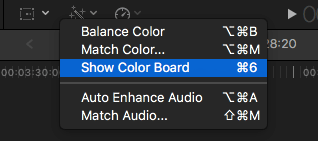
- On effect browser you can easily access color correction effects inside the color category; that is also easier to allocate.
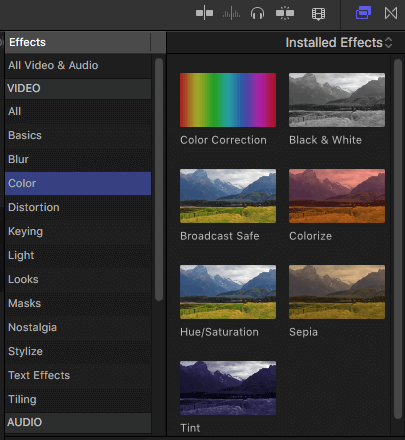
- Choose Window and then click on Go To, you will find Color Board on the appeared drop-down menu.
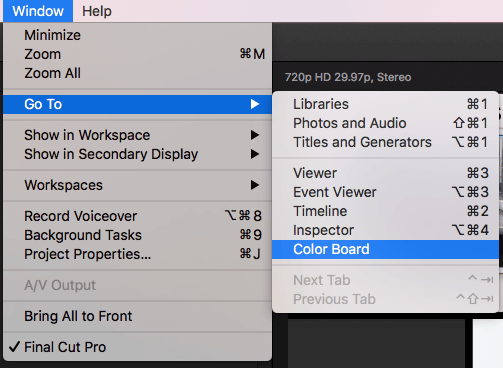
- All the color correction effects will start appearing in the effects section available on the video inspector.
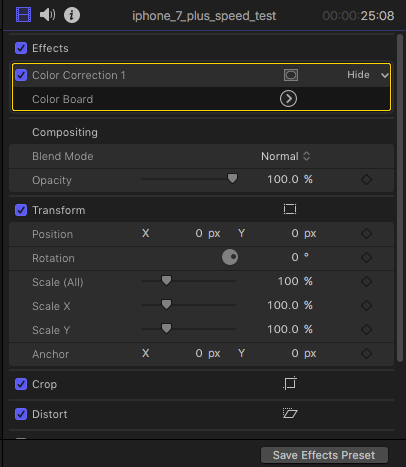
Step 2
As soon as you start working on Color Board, it is good to open Video Scopes on your system. For this you need to click on a small icon of light switch available at the top right corner of the viewer and then select Show Video Scopes from drop-down menu. It can be also done by simply pressing Command+7.

As soon as you make this selection, the video scopes window will automatically appear on the next viewer. Here users can easily obtain information related to the current video frame, and they can be easily configured as per need. Go to the settings option available on the top right side of the window and then hit the Waveform option.
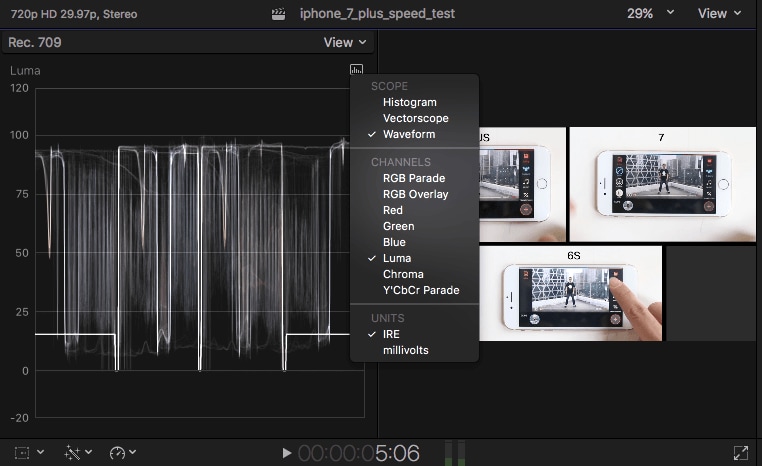
Step 3
Now it is time to work on color correction directly. There are three types of color corrections that users need to work upon: Hue, Saturation, and Exposure. Here is some brief information about all of these:
Exposure or Brightness: On the Color board window you can easily make adjustments for brightness levels of video clips. As you move on to different portions of the image ranging between dark and white parts, the scope will keep on displaying waveforms with values between 0 and 100 representing darkness and brightness respectively. The master slider available on screen helps users to make overall adjustments for brightness by using three control options: highlights for white circles, midtones for gray scale and shadows for black parts. Consider waveform values as a guide for adjustment and move controls up and down to adjust contrast as per need.
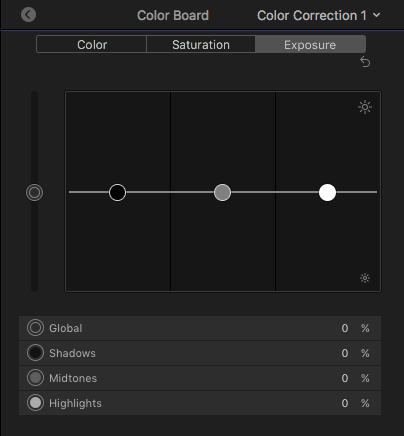
Saturation: It refers to the richness of colors in an image. Simply select saturation pane from the color board and on the video scopes window you can use the settings menu directly to adjust saturation information for every pixel. The image pixels that are far away from the center of vectorscope circle means they are more saturated as compared to pixels that are little bit closure.
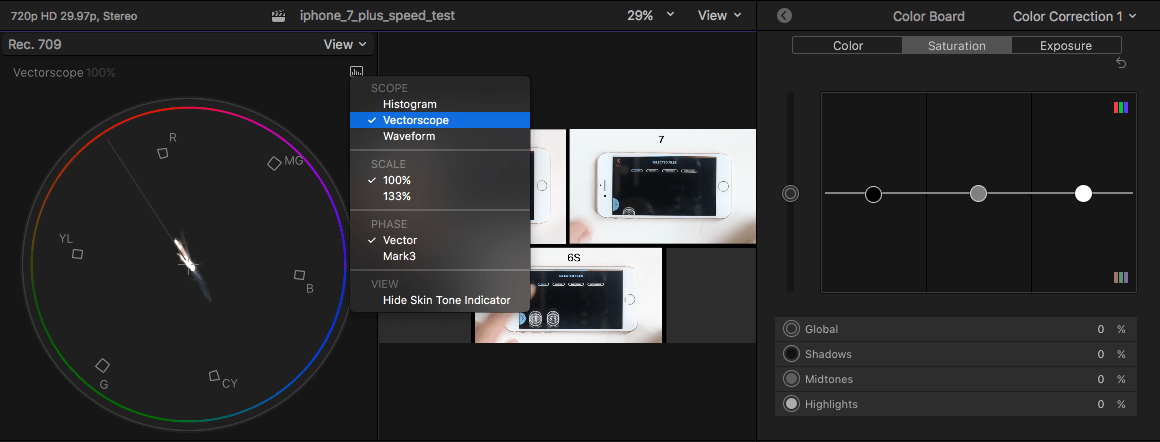
Hue: Hue displays the actual color values in images or frames in terms of primary colors: red, blue, and yellow. Use color pane from color board to adjust hue that is displayed in the form of a rainbow on screen. It is possible to manipulate values for highlights, midtones and shadows individually as per need. Using the histogram option available on settings menu can help you to make direct adjustments for all these components.
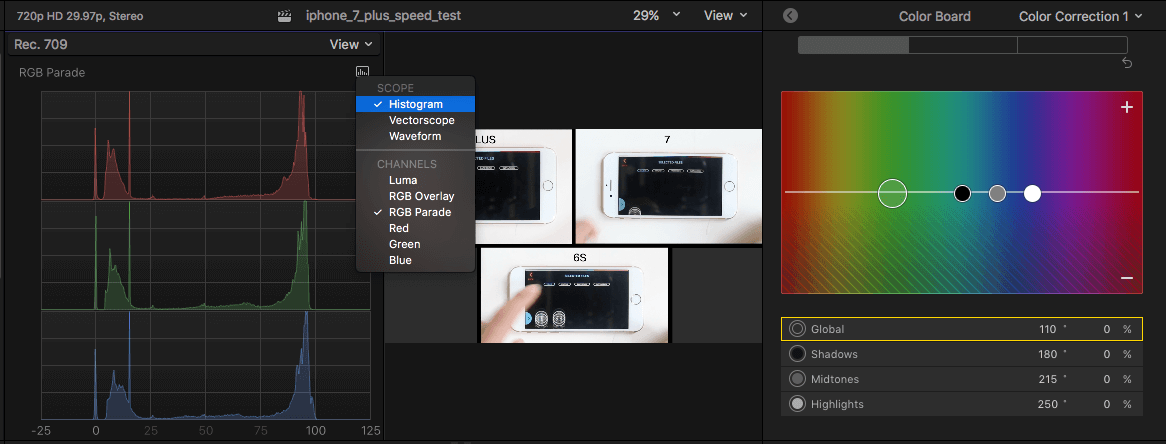
Step 4
It is possible to preview all the corrections on the original image before making them final. Simple hit the arrow with left-facing formation in the top left corner of the Color Board and then return to the video inspector. Hit on the Blue box to switch between correction On and Off options.

Here’s the video tutorial on how to correct color in Final Cut Pro:

Benjamin Arango
Benjamin Arango is a writer and a lover of all things video.
Follow @Benjamin Arango
Also read:
- [New] 2024 Approved The Essential Technique Screen Recording on the Go
- [Updated] 2024 Approved GalleryGuide Adjusting Post Dimensions in Instagram
- 2024 Approved Avoiding Fakes Instagram Selfie Wisdom
- 重製 Windows 10 或 11 中永久删除文件的六个方法 - 完美恢复技巧
- Easy Ways to Manage Your Sony Xperia 1 V Location Settings | Dr.fone
- In 2024, Get Filmora for Free No Cost, No Virus, No Hassle
- Labor Day 2024 Ultimate Television Bargains: Save Big on Your Favorite Shows (56+ Deals) | ZDNET Insider Tips
- Navigate Minecraft Faster with the Ultimate Teleport Command Tutorial
- New Final Cut Pro X Creating Stunning Titles for Your Videos
- Say It with Feeling A Beginners Guide to Making a Valentines Day Video
- Streamlining YouTube Videos for Facebook Circulation for 2024
- Updated Best Free VOB Video Editor Options Ranked
- Title: Final Cut Pro Color Correction Tips, Tricks, and Techniques for 2024
- Author: Giselle
- Created at : 2024-12-09 16:09:29
- Updated at : 2024-12-16 16:13:17
- Link: https://ai-vdieo-software.techidaily.com/final-cut-pro-color-correction-tips-tricks-and-techniques-for-2024/
- License: This work is licensed under CC BY-NC-SA 4.0.